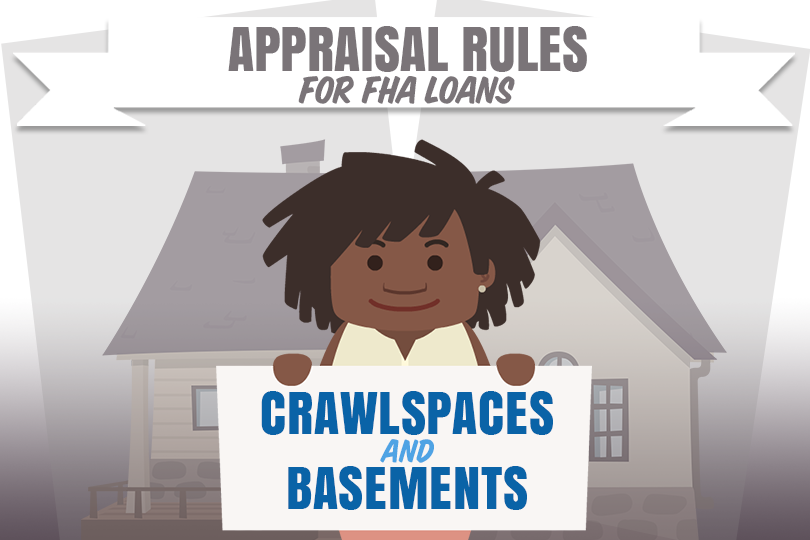FHA Appraisal Rules for Basements
May 7, 2022
You may not be on the hook for those corrections, but if you are trying to negotiate with a seller in a competitive market and you really want that house, negotiating who pays for the appraisal correction might be something to consider.
With that in mind, what are the FHA appraisal rules for a home that comes with a basement or crawlspace? The FHA appraisal process includes specific standards in this area which must be met. In cases where there are corrections required as a condition of loan approval, those corrections must be made and inspected--it’s not done on an honor system.
The basic rules in this area begin with the general condition of the foundation--it must be adequate to properly support the home.
HUD 4000.1 contains rules for the lender and appraiser. It states, “The Mortgagee must confirm that all foundations will be serviceable for the life of the Mortgage and adequate to withstand all normal loads imposed.” And what happens if this is not true?
The FHA list of “defective conditions” for basements, crawlspaces, and the foundation includes:
“…evidence of possible structural failure (e.g., settlement or bulging foundation wall, unsupported floor joists, cracked masonry walls or foundation)”
Such conditions would be noted by the appraiser--corrections are recommended where feasible but such corrections are not always possible. If the problems cannot be corrected, the home cannot qualify for an FHA mortgage.
The foundation and the basement should be “serviceable” over the entire duration of the loan term or must be repaired or modified to make that possible.
According to HUD 4000.1, “The Appraiser must perform a visual observation of the foundation and Structure of the improvements and report those results.” In cases where the FHA appraiser detects a structural issue, HUD 4000.1 says the Appraiser must “address the nature of the deficiency in the appraisal where physical deficiencies or adverse conditions” are reported and which may demand an inspection.
Basement issues may include things not directly related to the structural soundness of the foundation. For example, sump pump systems must be suitable to properly service the home and must be in good repair. If the appraiser notes the sump pump system does not meet these basic requirements, corrections are likely to be required in the appraisal report.
Any evidence of excessive moisture in a basement or crawlspace is an area of concern for the appraisal. If you note standing water, trickling water, or very damp basement walls when you do your initial walkthrough of any property, you can expect the appraiser to note the same problems.
------------------------------
RELATED VIDEOS:
Here's the Scoop on Conventional Loans
When Do You Need a Cosigner?
Analyzing Your Debt Ratio

FHA Loan Articles
November 21, 2024The dream of homeownership is with some from a young age. But in an uncertain housing market, some grapple with the question: Is buying a home the right move for me?
While renting offers relocation flexibility and lower upfront costs, homeownership provides a wealth of financial and personal benefits.
November 20, 2024Refinancing your mortgage offers a way to cash in on your home equity, potentially reduce your interest rate, or modify your loan term. Borrowers ready to consider have options including FHA loans and conventional loans.
While both provide avenues for refinancing, each loan type may be best for specific needs and financial circumstances. What are the differences between FHA and conventional refinance options?
November 14, 2024The home you want to buy might seem perfect, or it may have a few flaws that are acceptable in the grand scheme of things. But what about issues you can’t spot just by walking through the property a few times? A home inspection provides an unbiased, expert assessment of the property's condition, uncovering potential issues that might not be noticeable to the untrained observer.
November 12, 2024Escrow is an important feature of most typical FHA loans. An escrow account is a third-party account where borrowers deposit funds designated for property taxes and other uses. Requirements to use escrow accounts typically stems from a need to protect all parties involved in the transaction
November 2, 2024When it’s time to consider buying a home, the Federal Housing Administration (FHA) offers two popular options. One is the traditional FHA purchase loan many use to buy a house in the suburbs. But not everyone wants to buy an existing property. Some want more control over the design and configuration of the home.
The other FHA construction loan option, the one-time close mortgage, comes in here. This option is for those who want to approve floor plans, have a say in the types of materials used to build the home and choose its features.







